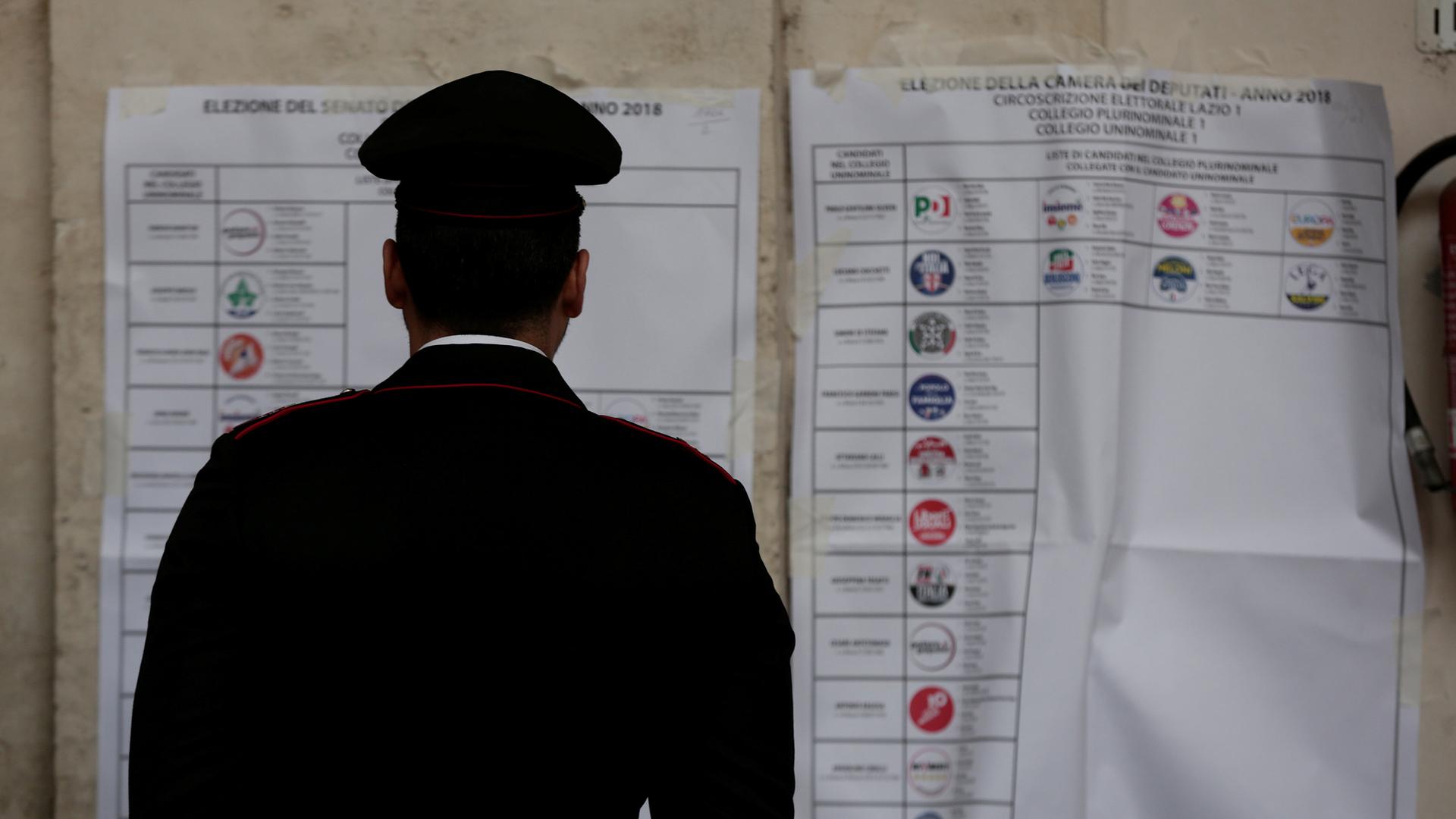Italy’s euroskeptic League claims right to govern after inconclusive vote
An Italian policeman looks at an electoral poster at a polling station in Rome, March 4, 2018.
Italy's euroskeptic League claimed the right to lead a new government on Monday after an inconclusive election gave its center-right alliance the largest bloc of votes.
The country faces a prolonged period of political instability after voters delivered a hung parliament on Sunday, spurning traditional parties and flocking to anti-establishment and far-right groups in record numbers.
"The markets have nothing to fear," League leader Matteo Salvini told reporters in Milan, hours after the anti-establishment 5-Star Movement also claimed the right to govern as the biggest single party.
Shares, bonds and the euro all weakened on prospects of an administration led by euroskeptic parties promising to ramp up spending.
Salvini, whose rightist alliance is on course for around 37 percent of the vote, criticized both the euro and European Union restrictions on national budgets.
"The euro was, is and remains a mistake," he said, adding, however, that a referendum over the continued participation of the eurozone's third-largest economy in the single currency was "unthinkable."
With the vote-count well advanced and full results due later on Monday, it looked almost certain that none of the three main factions would be able to govern alone and there was little prospect of a return to mainstream government, creating a dilemma for the EU.
The largest share went to the alliance including the League and former prime minister Silvio Berlusconi's Forza Italia (Go Italy) — but for the first time the League emerged as the senior partner.
The role reversal marks a bitter personal defeat for the billionaire media magnate and his party, which took more moderate positions on the euro and immigration while the far-right League campaigned on a fiercely anti-migrant ticket.
5-Star in the mix
Earlier on Monday, a senior 5-Star official said forming a coalition without it would be impossible after it soared to become Italy's largest single party by far, heading for around 32 percent.
The League's economics chief on Monday raised the prospect of a ruling alliance with 5-Star, which would likely be euroskeptic and be little interested in further European integration.
The biggest loser in the election was the Democratic Party that has ruled since 2013. Its leader, former prime minister Matteo Renzi, has decided to resign, Italian news agency Ansa said on Monday.
A Renzi spokesman said he knew nothing about such a decision and that Renzi would speak publicly at 5 pm.
Despite overseeing a modest economic recovery, the ruling center-left coalition trailed a distant third on 22 percent, hit by widespread anger over persistent poverty, high unemployment and an influx of more than 600,000 migrants over the past four years.
Swift new elections to try to break the deadlock are another plausible scenario.
Prolonged political stalemate could make heavily indebted Italy the focus of market concern in Europe, now that the threat of German instability has receded after the revival on Sunday of a grand coalition under Chancellor Angela Merkel.
In early European trading, the euro dipped while investors dumped Italian government debt, with the yield on its 10-year bonds, jumping 10 basis points.
Parliament will meet for the first time on March 23 and President Sergio Mattarella is not expected to open formal talks on forming a government until early April.
'Italy ungovernable'
During two months of election campaigning, party leaders repeatedly ruled out any post-election tie-ups. However, Italy has a long history of finding a way out of apparently intractable political stalemate.
The 5-Star once rejected talk of any power sharing, but now says it is willing to discuss common policies but not negotiate over cabinet posts.
Led by 31-year-old Luigi Di Maio, it was formed in 2009 and has fed off public fury over institutional corruption and economic hardship. Some have questioned whether other parties would be able to work with it.
"Di Maio wins, Italy ungovernable," was the front page headline on La Stampa newspaper.
Claudio Borghi, the League's economics chief, on Monday suggested a center-right headed by Salvini could find a modus vivendi with 5-Star, while senior 5-Star member Riccardo Fraccaro said nobody would be able to govern without his party.
Five-Star and the League once shared strong anti-euro views, but 5-Star now says the time for quitting it has passed.
Its flagship proposal in the election campaign was a minimum monthly income of up to $963 for the poor, helping it draw massive support in the underdeveloped south.
By contrast, Salvini and Berlusconi — heading for almost 18 percent and 14 percent respectively — appeared to have dominated the wealthier north, with the center-left squeezed into a narrow stretch of central Italy.
Anti-establishment parties have been on the rise across Europe since the 2008 financial crisis, and Italy's economy remains 6 percent smaller than a decade ago and unemployment is stuck at about 11 percent.
By Crispian Balmer and Steve Scherer/Reuters
Additional reporting by Gavin Jones, Francesca Piscioneri, Giselda Vagnoni and Isla Binnie; editing by Philip Pullella and John Stonestreet.
